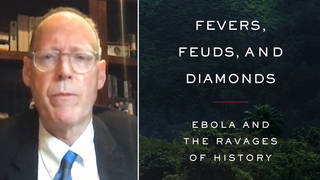
Topics
By Amy Goodman and Denis Moynihan
The headlines shift hourly between Ebola and ISIS. The question is often asked, “Should we put boots on the ground?” The answer is yes — but not in the Middle East. We need tens of thousands of boots on the ground dealing with Ebola: boots of doctors, nurses, health professionals, dealing with this wholly preventable global health disaster.
Ebola is a small virus that is revealing very large problems with the world’s public health systems. The few known cases here in the United States have provoked a climate of fear and a growing awareness of just how vulnerable we are to a virulent illness let loose in our society. Imagine how people feel in the impoverished West African nations of Guinea, Sierra Leone and Liberia, where the number of cases is in the thousands, and the infrastructure is simply incapable of dealing with the burgeoning number of infected people.
“This is an international humanitarian and health crisis. It threatens the stability of the region politically, economically, and, of course, human health matters most,” said Lawrence Gostin, faculty director at the O’Neill Institute for National and Global Health Law at Georgetown University. Speaking on the “Democracy Now!” news hour, he said, “For the second time in the history of the United Nations, the U.N. Security Council called a health threat—AIDS was the first, Ebola is the second.” He was speaking as news arrived that a second health worker in Dallas tested positive for Ebola. “We should be mobilizing much, much more,” he said. “We should have done it earlier. We should do it now.”
The World Health Organization announced the latest Ebola outbreak in Guinea on March 23 of this year. The outbreak grew, spreading to neighboring countries and jumping over several to reach Africa’s most populous country, Nigeria. It killed tens, then hundreds, but largely stayed off the world stage until two white, American aid workers contracted the disease. Dr. Kent Brantly and missionary Nancy Writebol were separately flown back to the United States. With the first Ebola patients ever to set foot in the U.S. shrouded in isolation suits, the disease became the lead story across the country.
Remarkably, as people were dying en masse of Ebola in West Africa, these two Americans survived, treated to some of the few existing doses of the experimental drug known as ZMapp. These are positive outcomes made possible with a well-funded healthcare system.
Enter Thomas Eric Duncan. He, too, had been infected by the Ebola virus. His illness progressed quite differently. His nephew, Josephus Weeks, summed it up eloquently in a piece published by The Dallas Morning News:
“On Friday, Sept. 25, 2014, my uncle Thomas Eric Duncan went to Texas Health Presbyterian Hospital Dallas. He had a high fever and stomach pains. He told the nurse he had recently been in Liberia. But he was a man of color with no health insurance and no means to pay for treatment, so within hours he was released with some antibiotics and Tylenol.”
Duncan went home to be cared for by his family, but got progressively sicker. Two days later, he went back to the hospital, where he was admitted with suspicion of Ebola. He rapidly declined and died on Oct. 8, as Weeks wrote, “alone in a hospital room.” Within days, we learned that one of his health-care workers, critical-care nurse Nina Pham, had contracted Ebola. Then another nurse, Amber Vinson, showed symptoms. Hours before she was diagnosed, she was on a plane with more than 130 people, flying back from Cleveland to Dallas. What if we had a health-care system that guaranteed thorough treatment, regardless of whether or not patients have private health insurance?
Republican Congressman Pete Sessions, who represents part of Dallas, told CNN that he wanted to block flights from West Africa from entering the U.S., though he said he would allow U.S. citizens through. I asked Lawrence Gostin for his response: “That is such a bad idea. … We live in a modern, globalized world; you can’t put a cellophane wrapper around a whole region and expect to keep germs out. It doesn’t work that way. And so, we think we’re trying to save ourselves, but actually we’re making ourselves at greater risk.”
The small island nation of Cuba has sent more than 160 doctors to West Africa to treat patients and help stem the spread of this epidemic. We should learn from Cuba. Instead, President Barack Obama sent in the Marines. They will soon be building field hospitals. But who will staff these new facilities? United Nations Secretary-General Ban Ki-moon has created an emergency task force to confront the Ebola crisis. The world must come together to save lives and stop this preventable catastrophe that threatens us all.
Denis Moynihan contributed research to this column.
Amy Goodman is the host of “Democracy Now!,” a daily international TV/radio news hour airing on more than 1,300 stations in North America. She is the co-author of “The Silenced Majority,” a New York Times best-seller.
© 2014 Amy Goodman / Distributed by King Features Syndicate
Listen to Amy Goodman’s weekly podcast on SoundCloud.











Media Options